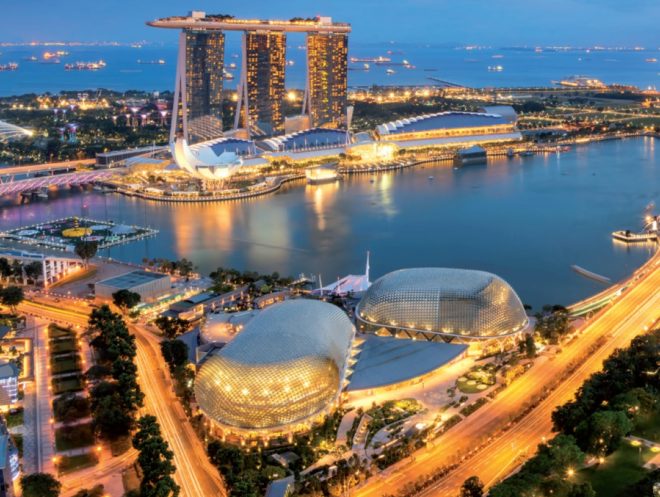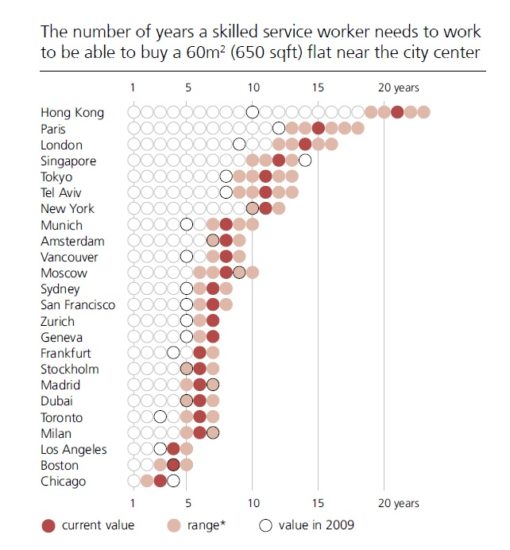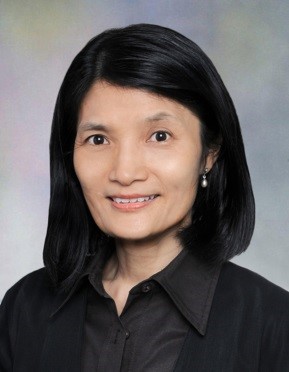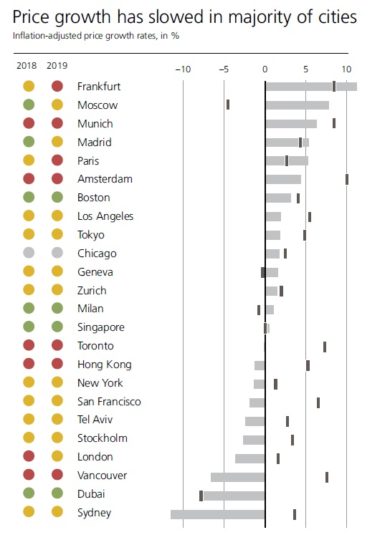The Q4 2019 UBS Global Real Estate Bubble Index
Read two experts’ opinions on the UBS Global Real Estate Bubble Index
Palace magazine is proud to have Alexander Karolik Shlaen, founder of the Singapore-based Panache Management Pte Ltd which is involved in real estate and technology investment projects, pen his thoughts about this UBS 2019 Real Estate Bubble Index Report. The UBS Global Real Estate Bubble Index that was published earlier this year provides us with a few notes on Singapore, Tokyo and Hong Kong, the only Asian cities in the index. Tokyo prices are up for the last 4 to 5 years despite the negative demographics of Japan that will eventually drag the property prices down. Most of the influx of the population into Tokyo is by locals who abandon smaller towns and move to this huge economic centre.

Singapore’s real estate resilience still holds
“The UBS Global Real Estate Bubble Index puts the housing market into a long-term perspective and is designed to track the risk of property price bubbles in global cities,” – UBS
Also, foreign buyers are very active in residential property, but some might wonder who they will be selling their properties in a few years when looking for an exit. It is unlikely the locals will be buying, and they definitely won’t be able to fill the void that will be created even if part of the current investors decided to sell. Though most people will find Japan more attractive as a tourist destination and the strategically located properties will enjoy good rental from Airbnb-style returns.
“On a global level, economic uncertainty is outweighing the effect of falling interest rates on urban housing demand,” said Mark Haefele, chief investment officer at UBS Global Wealth Management.”
Hong Kong as always is high up in these kinds of indexes with very positive property indication. But we still have to see any price reduction in this forever-in-demand city, that even the unprecedented social unrest doesn’t seem to affect its stratospheric prices. One should wonder if the pricing there is a “bubble” or just a result of actual, strong demand for property in this super city. And without a doubt, Hongkongers pay dearly for their homes. They will need 22 years of work to buy the same flat in their city that will take a Singaporean just 12 years.

Facts of skilled worker and how he/she will need to earn a living to buy a property
That brings us to Singapore. Among all the 24 world cities in the UBS Global Real Estate Bubble Index, only four have the current value of their property below the cost in 2008. These four cities are Milan, Chicago, Dubai and Singapore. UBS indicates that the price is fair for Singapore market, but the readers should take a note that while other cities stated in the index are calculated in the broad meaning of their property market, in Singapore some 80 per cent of the market is under the government agencies control, what is called the Housing Development Board, or HDB.
Which means that only 20 per cent of the Singapore property market is in the private market. The vast majority of Singaporeans own and live in HDB, while a small percentage of Singaporeans live in condos and landed properties. The majority of the condos are rented to foreigners, who are limited by regulations to buy or rent HDBs. Thus, the calculation of how many years it takes to buy a property in Singapore is not entirely correct here, as it takes much fewer years for local citizens to buy their subsidised HDB. Taking these points into consideration, it is pretty clear that the private market in Singapore is well below its real value. Singapore is proving itself time and again to be relatively affordable on a global scale. But the prices won’t go much up anytime soon due to the harsh cooling measures in place. These measures are responsible to bring the private market prices below their real value, as we can see from this index comparison. Additionally, while Singapore prices declined in the last 10 years, the incomes of the local population grew. I estimate the mid-to-long term steady appreciation of the property prices. Also, I am predicting the interest rates to be soft for years to come, that might accelerate the appreciation of this limited and attractive property market. Read about Alex Shlaen’s other stories here.

Luxury Expert columnist – Alexander Karolik-Shlaen
About Alexander Karolik Shlaen
Alexander Karolik Shlaen, Executive MBA, is the founder of the Singapore-based Panache Management Pte Ltd which represents Aston Martin Interiors, Tonino Lamborghini Casa and Formitalia design lines in Asia. Panache Management is involved in real estate and technology investment projects and provides luxury interiors and design for exclusive real estate, private jets and superyachts. Shlaen has appeared in various regional and global media and has written the Luxury Expert columns of regional business magazines since 2009. He was also the chairman of the judges’ panel for Asia Property Awards and is frequently sought to attend established business forums. Learn more on PanacheManage.com
Another Insight: List Sotheby’s International Realty, Singapore.

Han Huan Mei, Director, Research, List Sotheby’s International Realty.
Price bubbles are known to occur now and then in most property markets — signs of this include the run-up of housing prices at a faster rate than the rise of incomes, low-interest rates, excessive mortgage lending, high liquidity and influx of foreign funds. The chart by UBS shows that Hong Kong, Munich, Toronto, Vancouver and Amsterdam were the top five most expensive cities in 2018 due to the rapid rise of residential prices. At the other end of the scale, Chicago was ranked as ‘undervalued’ while Milan, Singapore and Boston were considered as ‘fairly’ valued. The Singapore residential market is a controlled free market as the government monitors it closely and will intervene to ensure stability and sustainable price growth. Interventions are necessary to keep private home prices on an even keel amid high liquidity of investable funds in the system. Invariably, Singapore’s enduring safe haven status makes it a favourable destination for property investment. Cooling measures such as the tightening of financing and imposing higher stamp duties have been fairly successful in Singapore, but not so in other cities like Hong Kong and Vancouver.
“Singapore has remained in the fairly-valued category, relatively unchanged in terms of bubble risk. The Singapore residential market is a free market in a controlled environment as the government monitors it closely and will intervene to ensure stable market stability and sustainable price growth. Interventions are necessary to keep private home prices on an even keel amid high liquidity of investable funds in the system. Invariably, Singapore’s enduring safe haven status makes it a favourable destination for property investment. Cooling measures such as the tightening of financing and imposing higher stamp duties have been fairly successful in Singapore, but not so in other cities like Hong Kong and Vancouver. Comparatively, an overpriced residential market might face greater risks as we face the headwinds of a recession due to the prolonged US-China trade war and a no-deal Brexit.” – Han Huan Mei, Director, Research, List Sotheby’s International Realty.

UBS 2019 Price Growth
As we face the headwinds of a recession due to the prolonged US-China trade war and a no-deal Brexit, it will be more difficult to correct an overpriced residential market so as to make homes more affordable.
Boxed: What’s Happening in APAC
The UBS Global Real Estate Bubble Index states: The bubble index scores have not increased in APAC cities over the last four quarters. In Hong Kong, momentum has abated, and prices have fallen slightly since mid-2018. Nevertheless, although the city is still in bubble-risk territory, given that prices have doubled over the last 10 years, there is no fundamental trend reversal in sight. Still, higher price volatility is likely over the next few quarters. Singapore’s housing market, in contrast, has been remarkably stable over the last few years. Regulatory tightening has proved effective and curbed excessive price growth. Real prices are basically on the same level as in 2012, such that the city remains in the fair-valued territory. In Sydney, a city that was in bubble-risk territory only two years ago, prices are plunging. They corrected by a double-digit number within a year, lowering the index score significantly. Lower foreign buying activity and tighter mortgage lending continued to mute overall demand. In contrast, prices in Tokyo have climbed by 5 per cent annually since 2014, decoupling from the rest of the country. As a consequence, the market has joined the group of highly unaffordable cities and valuation has increased.



